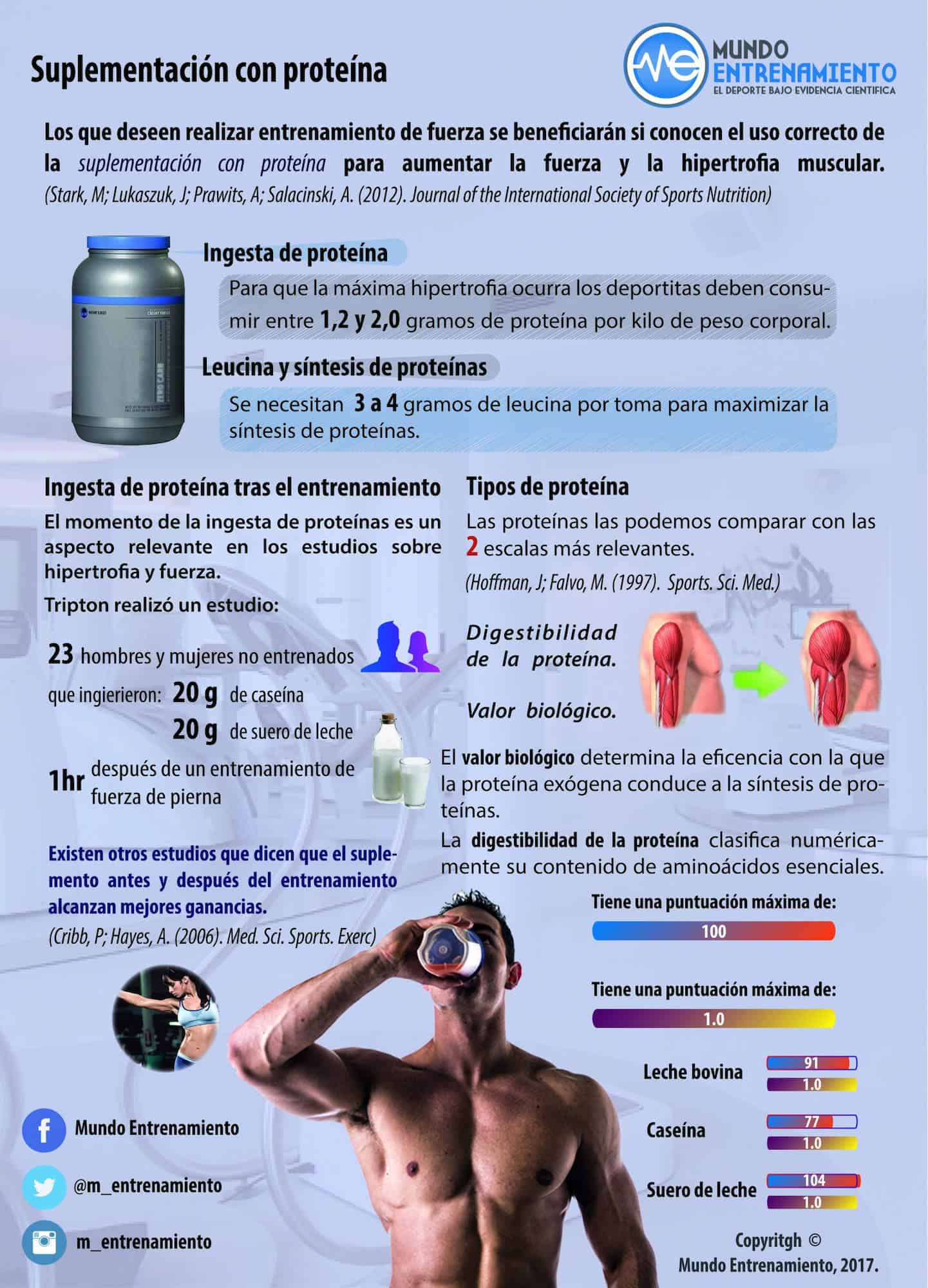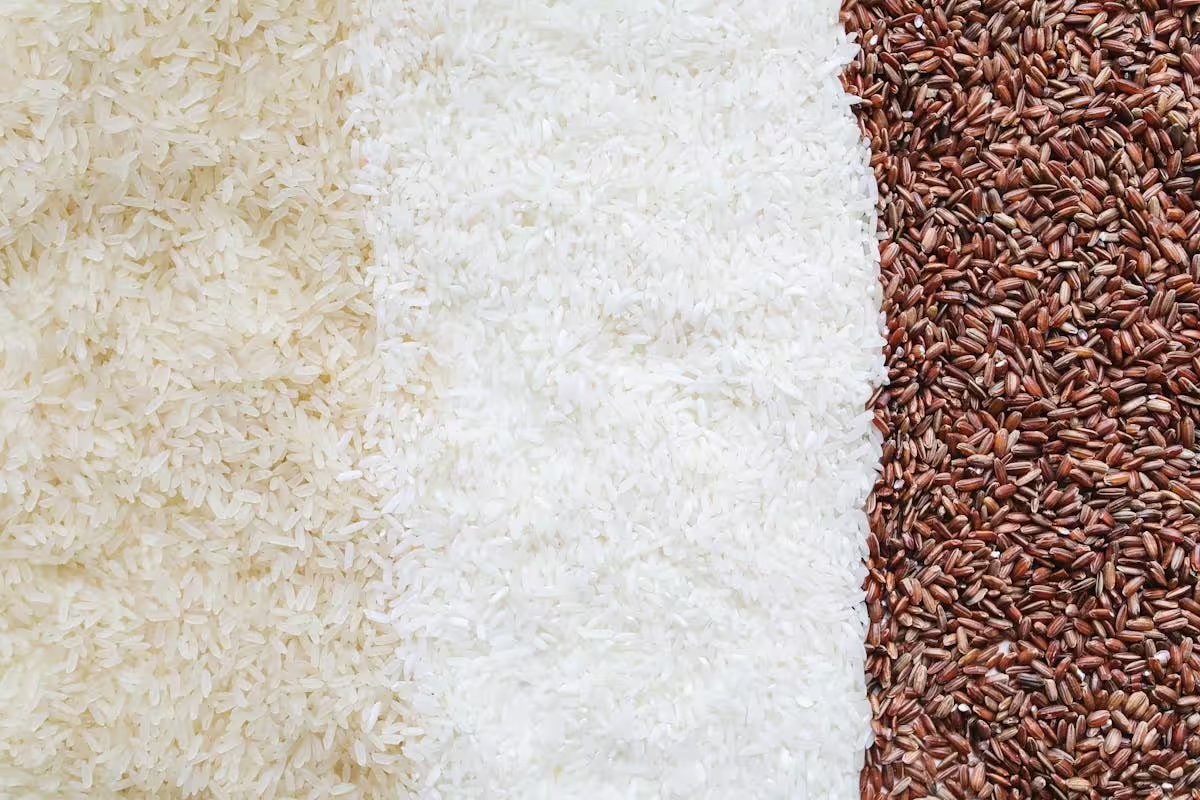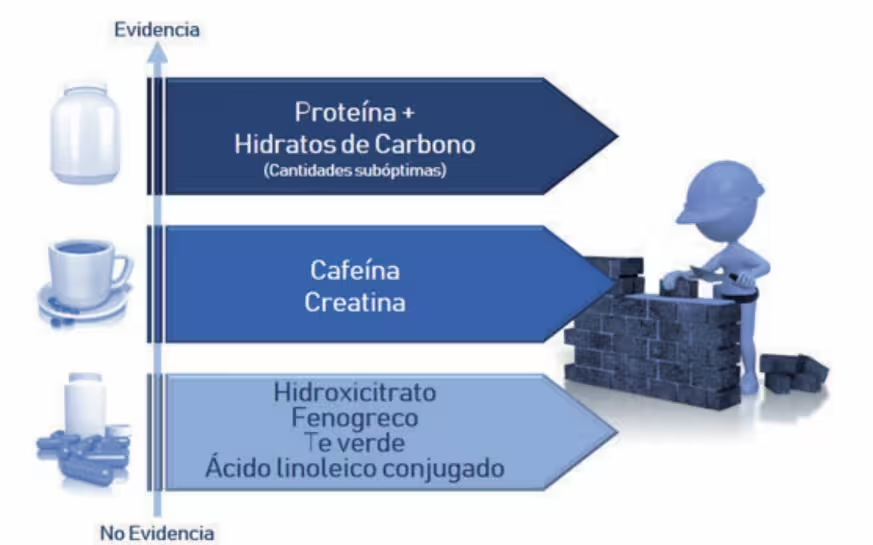In this article we are going to see which is the best muscle recuperator and its main benefits for fatigue after a hard workout.
In addition, we will name some carbohydrate foods that could act as the best muscle recuperator apart from the supplements mentioned in this article and we will comment on the synergistic effect that the intake of different nutrients has on glycogen resynthesis.
What does a muscle recuperator consist of?
A muscle recuperator is a post-workout supplement that helps reduce muscle fatigue and accelerate recovery after intense exercise. Therefore, the best muscle recuperator we choose must produce this effect.
The best muscle recuperator is one that as a food supplement contains all the necessary proteins, carbohydrates, amino acids and generally, vitamins, which is taken after physical training to help regenerate the muscle fibers that have been damaged during exercise.
However, although these recuperators contain proteins, the percentage is lower than in other supplements specifically designed for muscle gain, so they are very common among runners, triathletes, swimmers, or cyclists, and in short, athletes who do not need to develop such an elaborate musculature as strength athletes or bodybuilders.
What is the best muscle recuperator?
After analyzing several scientific evidences on the effect of different proteins, amino acids and carbohydrates on muscle recovery, the following list of the best muscle recoverer has been concluded. Several supplements are included in this list (1,2):
- Citrulline malate
- Branched Chain Amino Acids (BCAA)
- L-Glutamine
- Proteins: whey protein isolate (Whey protein isolate)
- Carbohydrates
Más proteína, menos grasas, menos carbohidratos y menos azúcar, eso es lo que la Whey Iso Protein de Be levels te aporta. De la máxima calidad y pureza, complemento perfecto para tu dieta que te ayudará en el mantenimiento de la masa muscular y correcto funcionamiento metabólico.
- Patente WPI 90, 90% proteína
- Contiene minerales: Hierro, Magnesio, Calcio, Sodio, Fósforo, Potasio*, Cloro, Zinc
- Sin gluten
- Baja en lactosa y Baja en carbohidratos y azúcar
In addition, the effects of other secondary supplements on muscle recovery have been studied (1, 2):
- Antioxidants
- Phosphatocreatine
- Caffeine
- The β-hydroxy-β-methylbutyrate or HMB with protein.
- Curcumin
Anthocyanoside antioxidants are polyphenols present in red fruits (blueberries, raspberries, blackberries), cherries and muscatel grapes), with potent antioxidant and anti-inflammatory effects. They are characterized because they help in the recovery of muscle damage induced by intense activity.
[article ids=”11090″] In fact, in conjunction with quercetin, they appear to be a useful and low-toxicity treatment for musculoskeletal problems. Because of the benefits of these types of antioxidants, they could also be included in the list of the best muscle recuperator (2).
In a study published in 1992, the capacity of the muscular deposits of phosphocreatine was demonstrated, since an increase of at least 20% was achieved in subjects who ingested 20 grams of creatine per day for several days.
In fact, creatine intake for 4-6 days increases muscle creatine and phosphocreatine content, improving sports performance and recovery during several repetitions of intense exercise. For this reason, it is also considered among the list of the best muscle recuperator (1).
In a recent review, it was shown that the use of creatine and HMB increases body mass and strength, and decreases protein degradation and muscle fatigue after hard training. HMB is a metabolite of branched-chain amino acids, leucine, which increases muscle volume due to the inhibition of protein degradation, influencing the metabolism of these amino acids (1).
Due to the effects provided by β-hydroxy-β-methylbutyrate in muscle, a supplementation with doses between 1.5 and 3 g per day, can partially prevent proteolysis induced by intense exercise and muscle degeneration, becoming another ideal option of the best muscle recuperator (1).
Finally, curcumin supplementation is used for its possible anti-inflammatory effects, in doses of about 5 g/day.
Its effectiveness translates into a reduction of the symptoms caused by muscle damage after intense training, so it could accelerate recovery by reducing pro-inflammatory interleukins and some inflammatory markers of muscle damage. For this reason, it could become one of the supplements that act as the best muscle recuperator (2).
Scientific evidence
There is scientific evidence as to why each of the best supplements we have mentioned is the best muscle recoverer.
Citrulline Malate
Citrulline mal ate is considered the best muscle recuperator because it is a natural nitric oxide that widens blood vessels, improving blood flow, oxygen transport and nutrient delivery to your muscles.
In fact, there are several studies showing that this supplement improves exercise performance and recovery (3).
This best muscle recuperator has also been shown to stimulate muscle protein synthesis, the muscle building process, and enhance the use of specific branched-chain amino acids to optimize muscle recovery.
Therefore, the benefits provided by citrulline malate after a workout are (3,4):
- Delays muscle fatigue, as it increases ATP production.
- Improved production of nitric oxide (NO), resulting in better pumping, recovery and strength.
- More power, due to increased phosphocreatine levels.
- Improved muscle building, as it facilitates muscle protein synthesis.
BCAA
According to studies carried out in September 2008 on how supplementation with branched-chain amino acids affects the body, it was concluded that although it does not improve sports performance, it does produce an increase in muscle recovery and the immune system (5).
In fact, this study highlights that BCAAs ingested before and after training provide great benefits in terms of repairing the degradation of muscle mass and helps to optimize your recovery (5).
The benefits obtained from the study on the efficacy of branched-chain amino acids are:
- Reduction of catabolism.
- Rebuilding of lean muscle mass.
- Reduction of delayed onset muscle soreness and stiffness.
- Delayed muscle fatigue.
- Improved body composition.
L-glutamine
This product is marketed as an essential amino acid in the body, and especially in muscle tissue. It is recognized as the main source of fuel for the small intestine and the cells of the immune system, which makes it an ideal supplement for those who perform hard workouts and are looking for the best muscle recuperator, faster (6).
L-glutamine is beneficial for strength-training athletes as it helps maintain muscle glycogen stores and protects against muscle breakdown during intense exercise (7).
It can be considered on the list of the best muscle recuperator as it helps to reduce the feeling of fatigue during prolonged exercise because it favors the maintenance of normal blood sugar levels by increasing insulin sensitivity.
The main benefits of L-glutamine are (6,7):
- Help maintain normal muscle function during exercise and recovery.
- Increases protein synthesis thereby reducing muscle soreness
- Helps maintain normal immune function
Protein: Whey Protein Isolate
In general, protein is essential to stimulate anabolic pathways and to promote tissue recovery after exercise. For this reason, scientific evidence shows that it is the best muscle recuperator after intense training (9).
[article ids=”8644″] It should be noted that it is essential that at least half of the daily protein intake be of high biological value, in order to meet the daily requirement of essential amino acids. In particular, the amount of leucine determines the functions in the construction of proteins and muscle recovery (8).
During intense periods of training, the needs increase notoriously, for this reason and in spite of the debates that exist in the scientific literature, it is accepted that the protein needs in people who perform prolonged physical activity are higher than 0.8 or 1 g per kg per day, especially when the exercise is intense and voluminous, it is desired to develop muscle mass, or a hypocaloric diet is performed to lose weight (Pintkänen, et al. 2002, Volek 1997, Wagenmarkers 1998) (9) (9).
On the other hand, during the day it is of interest to provide nutrients that are rapidly absorbed, since meals are usually eaten every 3 to 4 hours. However, to stimulate anabolic pathways in the evening it may be a better idea to opt for a casein (12).
Nowadays, the use of different powder preparations with a high protein content as the best muscle recuperator is becoming widespread among a large part of the sports population, but also in general to improve the quality of life and health (9).
Most protein preparations are produced and obtained from certain main sources, such as milk, egg, bovine colostrum, soy, and occasionally wheat.
These preparations constitute the raw material for obtaining high concentrations of proteins whose quality can be modified depending on the processing used during their elaboration (Etzel 2004, Hoffman & Falvo 2004). However, the protein that stands out most in the market for its nutritional properties is whey protein.
Whey protein or whey protein is the product that results from the extraction and drying of the protein found in whey. It provides a great amount of nutrients, among which essential amino acids such as Leucine stand out.
In addition, some Whey Protein formulas help to control or reduce weight, as they are low in fat and sugars and have a satiating effect (9).
The best muscle recuperator with a high protein content according to scientific evidence is belevels Protein: whey protein isolate (10,11,12).
Más proteína, menos grasas, menos carbohidratos y menos azúcar, eso es lo que la Whey Iso Protein de Be levels te aporta. De la máxima calidad y pureza, complemento perfecto para tu dieta que te ayudará en el mantenimiento de la masa muscular y correcto funcionamiento metabólico.
- Patente WPI 90, 90% proteína
- Contiene minerales: Hierro, Magnesio, Calcio, Sodio, Fósforo, Potasio*, Cloro, Zinc
- Sin gluten
- Baja en lactosa y Baja en carbohidratos y azúcar
Whey proteins provide Cysteine (2.5%), a sulfur-giving amino acid and precursor of glutathione synthesis (an essential antioxidant that protects the body against damage caused by the generation of free radicals). It also has other microfractions that favor the release of growth factors such as somatomedin (IGF-1), which makes it the best muscle recuperator (9).
However, they lack phenylalanine (essential amino acid with fundamental functions for the synthesis of brain neurotransmitters), glutamine, arginine, and taurine, essential amino acids in situations of high physical demands (Di Pasquale 1997, Naclerio Ayllón 1999). (9).
The best whey protein muscle recuperator can be presented in different formats: protein powder, concentrated proteins and isolated proteins.
- Whey protein powder: can be found in sweet form, as salad dressing, demineralized as used in children’s meal additives and other reduced forms used in various products in addition to sports supplements.
- Whey protein concentrates: ash, most of the milk lactose, water and some minerals have been removed. However, more biologically active products are found in these concentrates than in protein isolates (Hoffman & Falvo 2004).
- Whey protein isolates: These are the ones that provide the highest protein concentration, even higher than 90%, due to the fact that in their elaboration an important elimination of fat and lactose contained in the whey takes place.
The following table shows the proportions of proteins found in the different preparations made from whey (Hoffman and Falvo, 2000).
|
Component |
Powder |
Concentrate |
Isolate |
|---|---|---|---|
| Proteins | 11-14,5% | 25-89% | + 90% |
| Lactose | 63-75% | 10-55% | 0,5% |
| Milk fats | 1-1,5% | 2-10% | 0,5% |
Carbohydrates
Not only the nutritional supplements we have mentioned are part of the best muscle recuperator, but a good combination of them together with a high carbohydrate (HC) content is needed.
One of the objectives of athletes should be to try to optimize the restoration of muscle glycogen lost during training, that is to say, to achieve an adequate carbohydrate intake as part of the best muscle recovery (13).
Once the athlete has performed a physical exercise lasting more than 1 hour, muscle glycogen reserves drop significantly, with a loss that can be around 90%. As a consequence, it is necessary to consume exogenously CH substrates to reach the glycogen values we had before starting the exercise (2, 13).
Complete replenishment of muscle glycogen stores after exercise occurs in the first 24-48 hours, with the rate of resynthesis being directly proportional to the amount of carbohydrate in the diet during the first 24 hours (2).
It is recommended to eat meals with 70-80% of carbohydrates over the total daily energy, to avoid that other nutrients may limit the adequate intake of CH (2).
It should be noted that the type of CH also affects glycogen synthesis after physical exertion. Glucose with fructose, in doses of 1-1.5 g/kg body weight every 2 hours, is more effective than fructose alone.
In addition, carbohydrate consumption at doses of 4 g/kg body weight during the 4-6 hours after exercise contributes to the recovery of normal muscle function after hard exercise (2).
Therefore, we can highlight that carbohydrate consumption after hard training could also be included in the list of the best muscle recuperator.
What foods can work as the best carbohydrate muscle recuperator?
Not only are there nutritional supplements, whether protein, amino acids, carbohydrates or vitamins that act as the best muscle recuperator after a hard workout, but we can also consume a wide range of foods that contain carbohydrates and facilitate digestion.
In these examples of foods we can include oatmeal or rice in hydrolyzed flour format, since on the one hand they are complex carbohydrates and do not greatly influence the functioning of insulin, but on the other hand they are pre-digested, which is essential after exercise when our body has not yet finished digesting food completely.
Synergistic effect of nutrient intake on glycogen resynthesis
Different nutritional factors have been studied that help to enhance glycogen resynthesis together with carbohydrate intake, as we can see in the following image: “The synergistic effect of nutrient intakes on glycogen resynthesis
glycogen resynthesis together with carbohydrate intake, as we can see in the following image:
In this sense, some studies, such as the one done in 2009 by Howarth et al; have shown that the simultaneous intake of CHO and protein can be beneficial for glycogen resynthesis because protein intake increases insulin secretion by the pancreas, stimulating glycogen resynthesis (14).
In addition, amino acids have been found to act synergistically with carbohydrates to stimulate insulin production due to two factors (Gonzalez et al., 2015; Mace, Schindler, & Patel, 2012):
- Increased incretin release by enteroendocrine cells in the intestine.
- Direct stimulation of pancreatic beta cells by amino acid concentrations.
The type of protein could influence insulin secretion. In fact, hydrolyzed protein has been shown to have a greater effect on insulin secretion than an intact protein, which could be due to its high digestibility and absorbability (Koopman et al., 2009; Morifuji et al., 2010). Also, whey protein appears to be a greater insulin stimulant than casein, possibly due to its higher leucine content (Reitelseder et al., 2011).
The addition of at least 0.3-0.4 g/kg/h of protein is needed to achieve the synergistic effect in CHO and protein mixture on insulin release (14)
[article ids=”91149″] Creatine has also been studied in its synergistic action for glycogen resynthesis. To test this effect Robert et al. in 2016 observed an increase in glycogen storage after exercise followed by intake of creatine supplementation (20 g/day) together with a carbohydrate-rich diet.
The evidence was observed within 24h after exercise and was maintained during 6 days of post-exercise recovery with maintenance of such a diet (14).
Therefore, this analysis could be a demonstration that creatine intake in conjunction with a high carbohydrate intake could be part of the best muscle recuperator for glycogen resynthesis.
On the other hand, caffeine has also been investigated as a synergistic effect on muscle glycogen resynthesis. Thus, one study observed that the intake of 8 mg/kg of caffeine together with CHO (1 g/kg/h) substantially increased glycogen content during 4h of recovery after training (14).
In fact, in 2008, Silva, Lott, Wickrama, Mota, & Welk, conducted a systematic review on the different compounds contained in coffee, which can affect muscle glycogen resynthesis.
The results showed that some of its components can activate different molecular pathways leading to an increase in muscle glycogen synthesis. This concluded that coffee could be another option for the best muscle recuperator in the athlete’s diet together with a high carbohydrate and protein intake (14).
On the other hand, it should be noted that the synergistic effects of compounds such as fenugreek (insulin mimetic and containing an amino acid, 4-hydroxyleucine), conjugated linolenic acid and hydroxycitric acid (from Garcinia Cambogia) on glycogen resynthesis are still being investigated in conjunction with CHO intake.
Clear effects have not yet been obtained, and it is too early to say whether these compounds are useful in improving glycogen resynthesis and improving muscle fatigue (14).
Bibliographic References
- Calleja, Dr. J. (2010). Post-competition recovery of the athlete. Review Archives of Sports Medicine, 138 (27): 281-290.
- Nieves Palacios Gil de Antuñano, et al. (2019). Nutritional supplements for the athlete. Ergogenic aids in sport – 2019. Consensus document of the Spanish Society of Sports Medicine. Arch. Med. , 36 (1): 7-83.
- Bendahan, D., Mattei, J. P., Ghattas, B., Confort-Gouny, S., Le Guern, M. E., & Cozzone, P. J. (2002). Citrulline/malate promotes aerobic energy production in human exercising muscle. British Journal of Sports Medicine, 36(4): 282-289.
- Pérez-Guisado, J., & Jakeman, P. M. (2010). Citrulline malate enhances athletic anaerobic performance and relieves muscle soreness. Journal of Strength and Conditioning Research, 24(5): 1215-1222.
- Negro, M., Giardina, S., Marzani, B., & Marzatico, F. (2008). Branched-chain amino acid supplementation does not enhance athletic performance but affects muscle recovery and the immune system. The Journal of sports medicine and physical fitness, 48(3). Link
- Piattoly, Tavis, et al. (2013). L-glutamine supplementation: effects on endurance, power and recovery. Current issues in nutraceutical research, 11 (1-2): 62.
- Antonio, J., & Street, C. (1999). Glutamine: A potentially useful supplement for athletes. Canadian Journal of Applied Physiology, 24(1): 1-14. Link
- Duan, Y., Li, F., Li, Y., Tang, Y., Kong, X., Feng, Z., Anthony, T. G., Watford, M., Hou, Y., Wu, G., & Yin, Y. (2016). The role of leucine and its metabolites in protein and energy metabolism. Amino acids, 48(1): 41-51.
- Naclerio, F. (2006). Monograph. Utilization of Proteins and Amino Acids as Dietary Supplements or Integrators.
- Hoffman, J; Falvo, M. (1997): Protein-which is best? J Sports Sci Med, 3:118-130.
- Boirie, Y; Dangin, M; Gachon, P; Vasson, M; Maubois, J; Beaufrere, B. (1997): Slow and fast dietary proteins differently modulate postprandial accretion. Proc. Natl. Acad. Sci, 94:14930-14935.
- Tipton, K; Elliot, T; Cree, M; Wolf, S; Sanford, A; Wolfe, R. (2004): Ingestion of casein and whey proteins result in muscle anabolism after resistance exercise. Med. Sci. Sports Exerc, 36:2073-2081.
- Murray, B., & Rosenbloom, C. (2018). Fundamentals of glycogen metabolism for coaches and athletes. Nutrition Reviews, 76(4), 243-259.
- Mata-Ordoñez, F; Grimaldi-Puyana, M. & Sánchez-Oliver, A.J. (2019). Muscle glycogen replenishment in athlete recovery. Euroamerican Journal of Sport Sciences, 8(1): 57-66.






